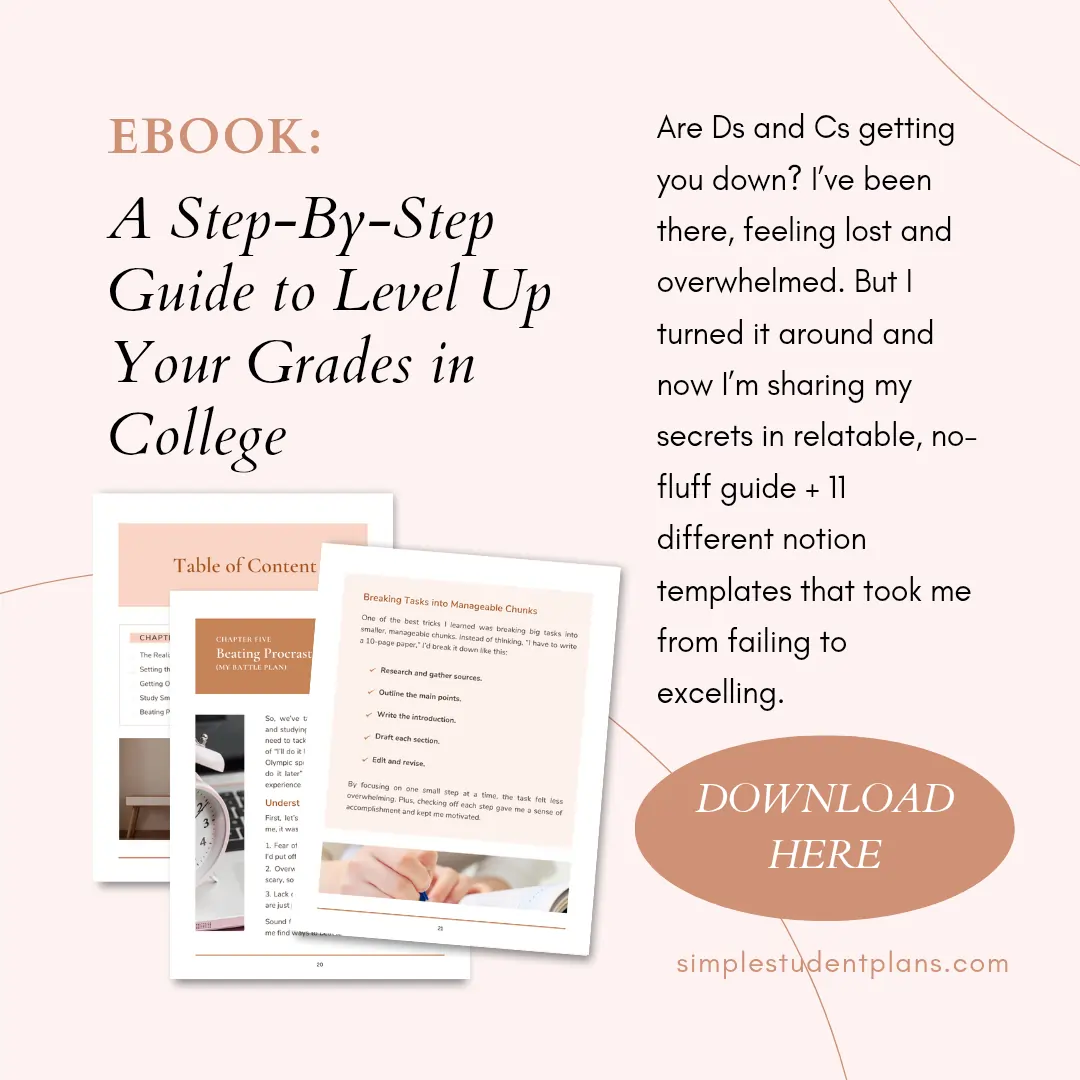College life is exciting, challenging, and sometimes overwhelming. Between classes, assignments, part-time jobs, and social life, it’s easy to feel like you’re running out of time every day. The truth is most students aren’t struggling because they don’t have enough time. They’re struggling because of productivity mistakes that waste their time and energy.
As an affiliate partner of various brands and sponsored content, SimpleStudentPlans may earn commission on qualifying purchases. Disclaimer | Advertise With Us
If you’re a student who wants to stay ahead, avoid burnout, and actually enjoy your college years, this guide will show you exactly what not to do. Let’s break down the 18 biggest productivity mistakes college students need to avoid and how you can fix them.
Why Productivity Matters in College
Productivity is more than just getting things done. It’s about using your time wisely so you can balance academics, social life, and self-care. Making simple changes in your daily habits can free up hours each week, reduce stress, and help you perform better in class.
In fact, research shows that productivity skills like time management and organization are linked to higher academic performance and lower stress levels (APA).
So, let’s dive into the common pitfalls that drag students down.
1. Procrastinating Until the Last Minute
One of the biggest productivity mistakes students make is waiting until the last possible second to start assignments or study for exams. Procrastination feels good in the moment, but it almost always leads to:
- All-nighters
- Lower grades
- High stress
Solution: Break tasks into smaller chunks. For example, instead of telling yourself “I’ll write the paper this weekend,” break it down into research, outline, introduction, first draft, edits. Use a planner or task manager like Todoist to stay on track.
2. Not Having a Daily or Weekly Plan
Waking up without a plan usually means spending hours figuring out what to do or worse, doing nothing productive at all.
Mistake: Letting your day “just happen.”
Fix: Use a simple planner or digital tool. A weekly plan helps you see deadlines ahead, while a daily plan gives you clear direction. Even writing down your top 3 priorities each morning can make a huge difference.
Pro tip: Try the time-blocking method; assigning chunks of time to specific tasks like studying, gym, or relaxation.
3. Multitasking
Students often think they can multitask, watch Netflix while studying, text friends while writing an essay but the brain isn’t built for it. Studies show multitasking reduces efficiency by up to 40%.
Example: Switching between writing a paper and checking TikTok will double the time it takes to finish.
Solution: Focus on one task at a time. Try the Pomodoro technique: 25 minutes of focused work, followed by a 5-minute break.
4. Poor Sleep Habits
Pulling all-nighters or sleeping only 4–5 hours is one of the worst productivity mistakes students make. Sleep directly affects memory, focus, and overall performance.
Quick fixes for better sleep:
- Stick to a consistent sleep schedule.
- Avoid caffeine after 4 PM.
- Use sleep apps like Calm or Headspace for relaxation.
5. Skipping Meals or Eating Poorly
Your brain is an engine and it needs fuel. Skipping breakfast or living on energy drinks and junk food makes it harder to concentrate.
Better choices:
- Meal-prep healthy snacks (nuts, fruit, yogurt).
- Keep a reusable water bottle with you to stay hydrated.
- Avoid too much sugar; it causes energy crashes.
6. Ignoring Exercise
A sedentary lifestyle leads to fatigue, low energy, and poor mental focus. Exercise is not just for fitness, it’s also a productivity booster.
Easy options for busy students:
- Walk around campus instead of taking the bus.
- Quick 15-minute bodyweight workouts.
- Join intramural sports for fun + fitness.
7. Overcommitting
Saying “yes” to everything, clubs, parties, jobs, group projects it can contribute to burnout.
Signs you’re overcommitted:
- Constantly tired
- Falling behind on assignments
- Feeling guilty for saying no
Solution: Learn to prioritize. If an activity doesn’t align with your goals, it’s okay to say no.
8. Not Using Technology Wisely
Technology can either be your best friend or your biggest distraction.
Bad use of tech:
- Scrolling social media during study time
- Forgetting to use productivity apps
Better use of tech:
- Use Notion for organizing notes.
- Block distractions with Freedom.
- Use Google Calendar to manage deadlines.
9. Cramming Instead of Spacing Out Study Sessions
Cramming may get you through tomorrow’s test, but it’s terrible for long-term learning.
Why it doesn’t work: You forget most of the material a few days later.
Solution: Use spaced repetition. Apps like Anki or Quizlet help you retain information by reviewing in small doses over time.
10. Not Taking Breaks
Some students think grinding non-stop equals productivity. But the brain needs rest to recharge.
What happens without breaks:
- Mental fatigue
- Lower creativity
- Decreased focus
Fix: After 50–60 minutes of studying, take a 10-minute break. Stretch, walk, or grab water.
11. Poor Note-Taking
Messy or incomplete notes make studying harder later.
Common note-taking mistakes:
- Writing everything word-for-word
- Not reviewing notes after class
Better strategies:
- Cornell method (divide page into notes, cues, summary).
- Outline method for structured classes.
- Digital notes in OneNote or Notion.
Read more about note-taking methods here.
12. Comparing Yourself to Others
Constantly comparing your grades, progress, or social life to others drains your energy and motivation.
Reminder: Everyone’s college journey is different.
Fix: Focus on your own growth. Use your past performance as a benchmark, not someone else’s.

13. Working in a Distracting Environment
Studying in the dorm lounge while friends are playing games is a recipe for failure.
Better options:
- Library quiet zones
- Coffee shops with good Wi-Fi
- Study rooms on campus
Pro tip: Create a “study kit” with noise-canceling headphones, snacks, and chargers.
14. Not Setting Clear Goals
Without goals, it’s easy to drift through assignments without real motivation.
Example of a vague goal: “Do well in class.”
Better goal: “Score at least 85% in Biology by studying 3 hours weekly.”
15. Ignoring Mental Health
Pushing through stress, anxiety, or burnout only worsens productivity.
Signs you need support:
- Constant fatigue
- Losing interest in things you enjoy
- Trouble focusing
Solution: Use campus counseling services or apps like BetterHelp.
16. Poor Time Management with Social Life
Parties, friends, and events are fun but not when they constantly interrupt important tasks.
Fix: Schedule social time after finishing key tasks. Treat it as a reward, not a distraction.
17. Not Asking for Help
Many students waste hours struggling alone when help is available.
Options for support:
- Office hours with professors
- Campus tutoring centers
- Study groups
Remember: Asking for help is not weakness, it’s smart productivity.
18. Forgetting to Review and Reflect
One of the most overlooked productivity mistakes is not reflecting on what’s working and what isn’t.
Fix: At the end of each week, ask yourself:
- What worked well?
- What wasted my time?
- What can I improve next week?
A simple reflection journal can keep you on track.
Mistakes vs. How to Fix It
| Productivity Mistake | Why It Hurts | How to Fix It |
|---|---|---|
| Procrastination | Leads to stress and poor grades | Break tasks into small steps |
| No daily plan | Wasted time, missed deadlines | Use a planner or time-blocking |
| Multitasking | Lowers efficiency | Focus on one task at a time |
| Poor sleep | Reduces focus and memory | Stick to a sleep routine |
| Skipping meals | Low energy | Eat balanced snacks and meals |
| No exercise | Fatigue | 15-min workouts or walks |
| Overcommitting | Burnout | Learn to say no |
| Bad tech use | Distractions | Use productivity apps |
| Cramming | Poor retention | Use spaced repetition |
| No breaks | Mental fatigue | Pomodoro or hourly breaks |
| Poor notes | Inefficient studying | Use structured methods |
| Comparisons | Low motivation | Focus on self-growth |
| Distracting space | No focus | Find quiet places |
| No goals | Lack of direction | Set SMART goals |
| Ignoring mental health | Burnout | Seek support, counseling |
| Social distractions | Missed deadlines | Balance with scheduling |
| Not asking for help | Wasted time | Use tutors, professors |
| No reflection | Repeated mistakes | Weekly self-review |
FAQs About Productivity Mistakes in College
1. What is the biggest productivity mistake college students make?
Procrastination is the most common mistake. It leads to cramming, stress, and lower performance. Planning ahead and breaking tasks into chunks is the best fix.
2. How can I avoid distractions while studying?
Choose a quiet study environment, use apps to block social media, and keep your phone away during study sessions.
3. Do all-nighters really help?
No. Research shows sleep deprivation reduces memory and focus, making all-nighters counterproductive. You’ll actually perform worse.
4. How do I balance academics and social life without losing productivity?
Schedule social activities after completing priority tasks. Treat them as rewards, not interruptions.
Key Takeaways
- Most students lose productivity because of bad habits, not lack of time.
- Avoiding procrastination, multitasking, poor sleep, and overcommitment can free up hours each week.
- Use tools like planners, productivity apps, and study techniques (Pomodoro, spaced repetition) to stay consistent.
- Take care of your health; sleep, exercise, and mental well-being are crucial to productivity.
- Reflect regularly to identify what’s working and improve your approach.
“Productivity isn’t about doing more things. It’s about doing the right things in the smartest way possible.”
By avoiding these 18 productivity mistakes, you’ll not only perform better academically but also create more time for the things you love about college.
